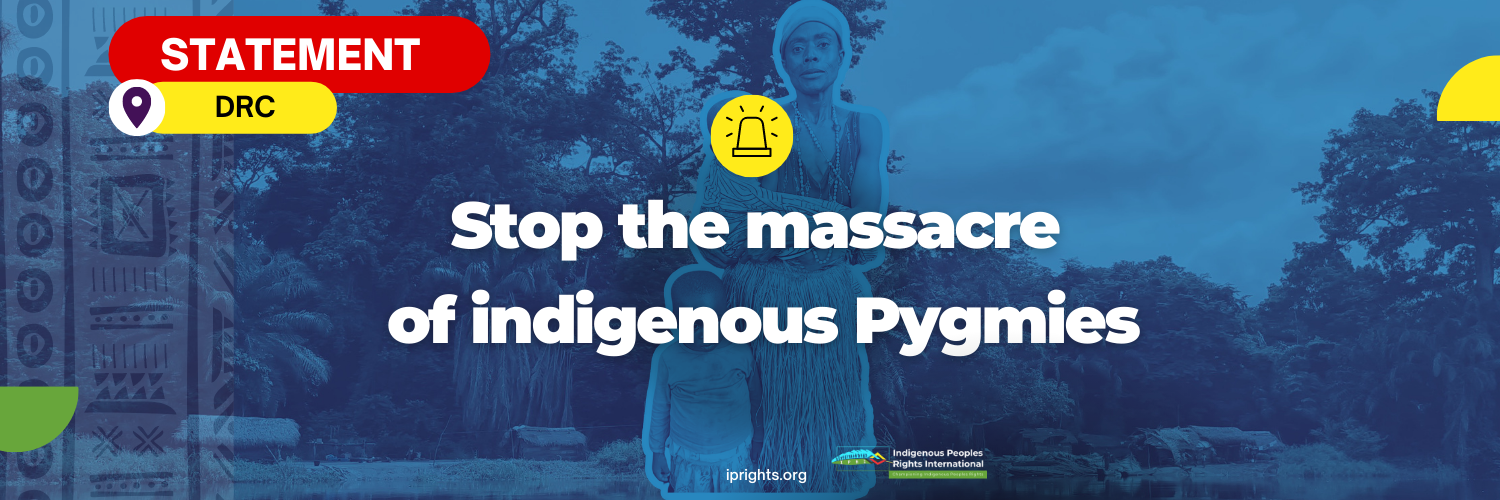
The Indigenous Peoples Rights International (IPRI) is outraged and strongly condemns the massacre of seven (7) indigenous Pygmies by the armed terrorist group ADF in the Democratic Republic of Congo. The Congolese State must take decisive action to protect the indigenous Pygmies and ensure access to justice for the families of those killed.
According to information received by IPRI, during the night of March 27, 2023, a group of ADF attacked Idohu village, Israël Lolueba, Walese Vontuku chiefdom, Irumu territory, in the Eastern of DRC, killing 7 indigenous Pygmy people. This massacre was preceded by another deadly attack 48 hours earlier, resulting in the killing of two more people.
Mr. Diel Mochiré, IPRI National Coordinator in the DRC and Provincial Director of PIDP North Kivu, said: “Peace is priceless and human life is sacred. The indigenous Pygmy peoples are not cows to be slaughtered. Security on the traditional territories of life of the indigenous Pygmy peoples in conflict areas is an urgent priority for the Congolese government”.
Unfortunately, despite the efforts made by the Congolese government, it has not taken steps to protect the Indigenous Pygmy Peoples in accordance with Law 022/30 on the Protection and Promotion of the Rights of Indigenous Pygmy Peoples in the Democratic Republic of Congo, nor to bring those responsible of the killings and attacks to justice, thus creating conditions for an escalation of violence against its population, including the Pygmies.
Indigenous Pygmy Peoples are unprotected against the continuous attacks of heavily armed groups that seek to displace them from their territories to seize them and their resources. According to information released by the UN on March 15, more than 100,000 people have been displaced, and dozens of them killed, following attacks by armed groups in North Kivu, a province in eastern DRC. Further, ADF attacks had left 97 civilians killed by mid-March alone, in addition to our Pygmy brothers and sisters who were recently killed.
The Indigenous Peoples Act, passed on July 15, 2022, obliges the Congolese State to protect and promote the social, economic, and cultural rights of Indigenous Pygmies, as well as their civil and political rights. This law recognizes the right of the indigenous Pygmies to their lands, territories and resources, yet they are not protected from land and resource grabs from armed groups and business enterprises.
“The implementation of law n.022/30 on the protection and promotion of the rights of indigenous Pygmy peoples is a matter for all stakeholders including the government, civil society, the private sector, and indigenous peoples”, said Mr. Mochiré.
Today, the whole world is pinning its hopes facing climate change on the carbon sinks of the Amazon and Congo forests, while their guardians, the indigenous peoples who have preserved them for millennia, are being murdered with impunity. The violence they suffer today, driven by the ambition to continue plundering their resources, threatens their survival as indigenous peoples.
Indigenous Peoples' Rights International, an organization created specifically to address violence and impunity against indigenous peoples, calls on:
- The Congolese State, to take without delay effective measures to protect the lives and rights of its indigenous populations, in accordance with its international obligations and national law. This includes providing adequate justice and appropriate reparation measures, as well as ensuring the safe return of the Pygmies to their territories.
- For UN relevant bodies including peacekeeping forces to investigate this case and take measures to prevent further attacks on the indigenous Pygmies.
IPRI calls on the international community to express its solidarity with the indigenous Pygmies and urge the government of the Democratic Republic of Congo to stop all forms of violent attacks on the Indigenous Pygmies. They deserve peace in their communities and to exercise their rights without fear.

